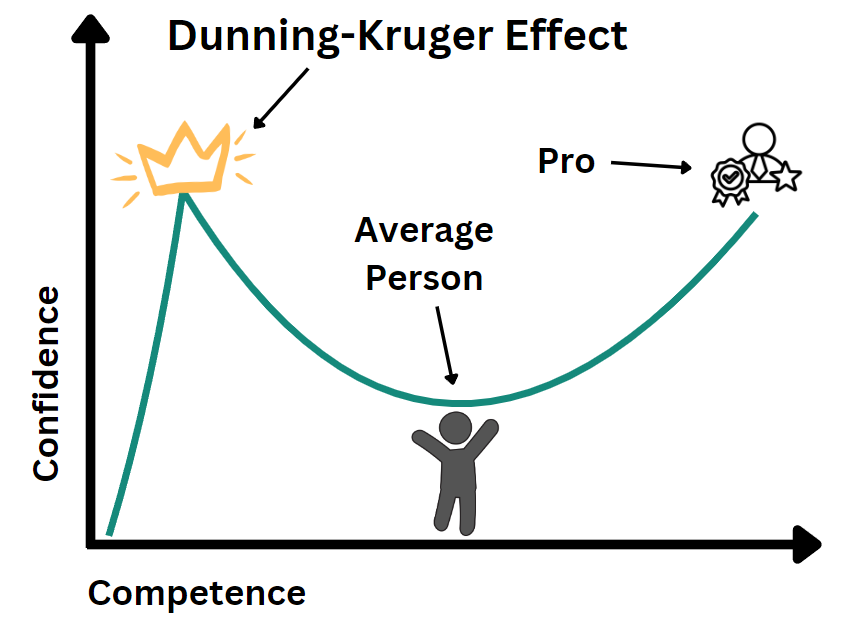People often think of intelligence as just a single number, like an IQ score. But modern research shows it’s way more complicated than that. Intelligence isn’t just about what you know; it’s more like a set of tools for understanding and interacting with the world.
To really get what makes highly intelligent people tick, it’s important to look beyond the usual behaviors and see how their minds are built to adapt, learn, and solve tricky problems.
Sometimes, what might seem like strange habits or personality quirks are just part of how they work through challenges.
Contents
- 1 Redefining What It Means to Be Smart
- 2 The Personality Blueprint: How Traits Shape Intelligence
- 3 Surprising Habits of Highly Intelligent People
- 4 The Inner World: How High Intelligence Shapes Thoughts and Emotions
- 4.1 The Anxious Analyst: Why Worry Often Comes with High Intelligence
- 4.2 The Power of the Wandering Mind: How Daydreaming Helps with Problem-Solving
- 4.3 The Dunning-Kruger Paradox: Why Smart People Often Doubt Themselves
- 4.4 The Humor-Intelligence Connection: Why Funny People Are Often Smarter
- 4.5 The Focused Monologue: Why Talking to Yourself Can Boost Your Focus
- 4.6 The Calculated Gamble: Why Smart People Sometimes Take Risks
- 5 Are You That Unconventional Genius?
Redefining What It Means to Be Smart

Today, we see intelligence as more than just raw brainpower. It’s about a range of skills that help us interact with the world. Some of the key skills include reasoning, planning, problem-solving, abstract thinking, and understanding complex ideas.
But what really sets this new view of intelligence apart is its focus on adaptability: the ability to adjust our behavior to fit different situations or even change the world around us. Instead of seeing intelligence as a fixed trait, this view sees it as a dynamic, interactive process.
This idea fits with theories of adaptive intelligence, which suggests that being smart involves a balance of three key abilities: creative, analytical, and practical skills.
- Analytical intelligence is the traditional problem-solving and abstract thinking.
- Creative intelligence is about coming up with fresh, unique ideas.
- Practical intelligence, or “common sense,” is the ability to take those ideas and make them work in the real world.
This model helps explain why intelligence can show up in so many different ways.

For example, someone might be great at thinking logically but still struggle to apply those thoughts in real-world situations. Intelligence is shaped by a mix of genetic factors and the environment, like how we’re raised, the education we get, and even the resources available to us. While genetics plays a big role, the environment can really influence how our potential gets expressed.
This more flexible, adaptive view of intelligence helps explain why some behaviors that might seem odd at first actually point to a sharp mind.
Take, for example, a messy desk. It might look like a flaw, but it could actually be an intentional setup to boost creative thinking. Similarly, swearing isn’t necessarily a sign of a poor vocabulary. It could be a way to express emotion more strongly or come across as more honest.
This new perspective helps us see seemingly random habits as part of a bigger picture of how we use our minds to adapt and solve problems.
The Personality Blueprint: How Traits Shape Intelligence

Think of intelligence as the engine, and personality traits as the steering and gears that decide how that engine’s power is used. Research has shown that personality and cognitive ability are closely linked. Personality plays a big role in how intelligence is expressed, developed, and applied throughout life.
Among the Big Five personality traits: Openness, Conscientiousness, Extraversion, Agreeableness, and Neuroticism, Openness to Experience stands out as the strongest connection to intelligence.
People high in Openness tend to be curious, imaginative, and open to new ideas. They actively seek out new learning experiences, and this drives a feedback loop: their curiosity helps them learn more, which, over time, builds their knowledge and expertise. So, Openness channels intelligence into accumulating real-world knowledge.
Neuroticism is a bit more complicated. While we often think of highly intelligent people as “moody geniuses,” the data shows a small negative link between neuroticism and intelligence. High levels of negative emotions can get in the way of thinking clearly, especially in stressful situations like tests.
But there’s a twist: high intelligence can sometimes protect against the downsides of neuroticism. Smart people may be more likely to analyze potential problems, which can make them anxious but also helps them think ahead and solve issues.

The connections between intelligence and traits like Conscientiousness, Extraversion, and Agreeableness are generally weaker and depend on specific parts of each trait. For example, while Conscientiousness doesn’t have a strong link with intelligence overall, being industrious (focused and hardworking) is positively related to cognitive ability.
On the other hand, the “orderliness” side of Conscientiousness can actually be negatively linked to intelligence, which explains why some highly intelligent people might seem a little disorganized.
Similarly, while Extraversion has a weak overall link with intelligence, being active (energetic) is positively related, while being sociable or outgoing can sometimes be negatively linked, suggesting that many smart people prefer to work alone.
Big Five Trait
General Correlation with Intelligence (g)
Key Facet-Level Nuances and Explanations
Openness to Experience
Moderately Positive (r ≈.20 to.30)
This is the strongest and most consistent link. Facets like Intellect, Curiosity, and Openness to Ideas are highly correlated. This trait drives the “investment” of cognitive ability into acquiring knowledge (crystallized intelligence).
Neuroticism
Weakly Negative (r ≈ -.09)
The “moody genius” is largely a myth in data. High neuroticism is linked to test anxiety and can interfere with cognitive processing. However, high intelligence may act as a buffer against neuroticism’s negative life outcomes. Linked to worry/rumination.
Conscientiousness
Near Zero / Complex (r ≈.01)
The overall correlation is negligible. However, the industriousness facet is positively correlated, while orderliness can be negatively correlated. This explains the “messy but productive” intelligent person.
Extraversion
Near Zero / Complex
Overall correlation is weak. The activity facet shows a positive relationship, suggesting active engagement with the world is beneficial. However, facets like gregariousness (sociability) can be negatively correlated, aligning with the preference for solitude.
Agreeableness
Near Zero / Weakly Positive
Overall correlation is the weakest. However, facets like compassion and empathy show moderate positive links, tying into emotional intelligence as a component of overall intelligence. Politeness can be negatively associated.
Also See: This Scientist Says We’re Living in The Matrix And He Has Evidence to Prove It
Surprising Habits of Highly Intelligent People

Some habits that go hand-in-hand with high intelligence might seem strange or even counterproductive at first. Things like staying up late, having a messy desk, swearing, or preferring to be alone are often seen as negative traits.
But when you take a closer look, these behaviors can actually make sense. They’re not flaws, but signs of a mind that values its own way of thinking over following social rules or keeping things neat and tidy.
Each of these habits is part of a bigger strategy to help the brain think more deeply, creatively, and outside the box.
Also Read: Your Brain is Hiding the Reality from You, And That’s Exactly What Keeps You Alive
The Nocturnal Mind: Why Night Owls Might Be Smarter

We’ve all heard the saying, “The early bird catches the worm,” which ties being productive to waking up early. But research suggests that night owls, those who stay up late, might actually have a cognitive advantage. Studies have found a link between higher IQ scores and a preference for staying up late and waking up later, a trait known as “eveningness.”
Evolutionary psychologist Satoshi Kanazawa argues that this habit could be a sign of cognitive flexibility and independence, traits often linked to high intelligence. In the past, humans lived by the sun’s schedule, so choosing to be active at night breaks from the norm, signaling adaptability and unique thinking.
That said, there are other reasons for this link. It’s possible that smart teens simply stay up later to study, which shifts their sleep patterns. But the connection still holds across different studies. The quiet and solitude of night could offer the perfect environment for deep thinking, creative ideas, and problem-solving, things that highly intelligent people often crave.
By stepping away from the traditional 9-to-5, night owls might be naturally tuning their schedules to match their peak mental performance times.
The Productive Mess: How Chaos Can Spark Creativity

We’re often told that a tidy desk means a tidy mind, but research shows that a messy environment might actually boost creativity.
Psychologist Kathleen Vohs at the University of Minnesota ran experiments that found a messy space can lead to more creative thinking. In one study, participants in a cluttered room came up with far more creative and interesting uses for ping-pong balls than those in a neat room.
The reason behind this seems to be that disorder breaks us out of traditional thinking. People in messy rooms were more likely to choose new, unconventional products over familiar ones, showing that physical chaos can encourage a mindset open to fresh ideas.
On the other hand, neat environments tended to encourage safer, more conventional thinking. This matches what we know about creative minds like Albert Einstein and Steve Jobs, both of whom were known for their disorganized workspaces. For them, the mess wasn’t a sign of a disorganized mind, but was a byproduct of a mind focused on creativity and new ideas over keeping things neat.
The Eloquence of Profanity: Why Swearing Can Be a Sign of Verbal Skill

People often think swearing means you have a limited vocabulary or low intelligence. But research shows the opposite.
Studies have found a strong link between how well someone can swear (that is, how many different curse words they can come up with quickly) and their overall verbal fluency. This suggests that a person’s ability to swear creatively isn’t a sign of a poor vocabulary, but rather an extension of a broader, more advanced word bank.
From a language perspective, swearing can actually be a powerful way to communicate. A well-chosen curse word isn’t a sign of poor expression; it’s often a precise tool for showing strong emotions, building connections with others, or making a point more effectively.
Plus, research has found that people who swear often tend to be more honest and less likely to lie, possibly because profanity reflects unfiltered expression. Interestingly, swearing has also been shown to increase pain tolerance, perhaps by triggering the body’s “fight or flight” response and releasing natural painkillers.
So, swearing could be a sign of a sharp mind and even a useful coping mechanism.
The Strategist’s Solitude: Why Some Highly Intelligent People Prefer Being Alone

Preferring to be alone is often seen as antisocial or lonely. But for many highly intelligent people, it’s a necessity.
A 2016 study by Norman Li and Satoshi Kanazawa found that, unlike most people, those with higher intelligence actually report lower life satisfaction when they socialize more often. This is the opposite of the trend seen in the general population.
The researchers explain this through their “savanna theory of happiness,” which suggests that our brains evolved for life in small, close-knit groups. Today’s busy, high-density social environments can be overwhelming and stressful. Highly intelligent people may be better equipped to handle these situations, but they don’t get the same comfort from constant socializing that others might.
On a more practical level, socializing takes a lot of mental energy. It requires us to read social cues, manage emotions, and keep up with conversations. For minds that thrive on deep thinking and abstract ideas, all of this can be draining.
So, for these individuals, choosing solitude is to conserve mental energy for the kinds of deep reflection, problem-solving, and creative work that require peace and focus.
The Inner World: How High Intelligence Shapes Thoughts and Emotions

High intelligence isn’t just about outward habits. It also creates a unique internal world of thoughts and emotions. Traits like anxiety, daydreaming, and self-doubt aren’t just random side effects; they seem to be direct results of a mind that processes the world in incredibly detailed ways.
Highly intelligent people tend to see the world with high resolution, picking up on potential threats, complex problems, and even their own limitations. This deep awareness shapes their inner experiences and emotional landscape, making them more sensitive to both the challenges and the nuances of life.
The Anxious Analyst: Why Worry Often Comes with High Intelligence

It’s common to see highly intelligent people struggle with worry and overthinking. Research shows a positive link between high verbal intelligence, our ability to think abstractly and reason, and a tendency to worry.
The reason behind this connection is cognitive. A strong ability to think through words and abstract ideas lets people imagine many possible future scenarios. While this is great for planning and problem-solving, it also means they often envision a lot of negative or threatening outcomes, which leads to worry and anxiety.
Clinical studies back this up. One study found that people with Generalized Anxiety Disorder (GAD) tended to have higher IQs than healthy individuals. The research suggests that both intelligence and anxiety might share similar brain activity patterns, particularly in the brain’s white matter. Some even think that intelligence and worry may have evolved together in humans.
This view shifts anxiety away from being just a disorder and instead sees it as a side effect of a mind that’s constantly analyzing future uncertainties. The same cognitive strengths that make someone great at problem-solving can also lead them to be highly aware of what might go wrong.
The Power of the Wandering Mind: How Daydreaming Helps with Problem-Solving

Daydreaming often gets a bad rap, seen as a sign of laziness or lack of focus. But research shows it’s actually an important and active mental process. Studies using brain scans at the University of British Columbia found that when we daydream, our brains are far from idle.
In fact, daydreaming activates not just the brain’s “default mode network” (which handles routine thinking), but also the “executive network,” which is involved in complex problem-solving.
This means that when we’re doing simple tasks that don’t require much attention, our minds can use that downtime to focus on bigger, more important problems—like career plans or personal issues. This process, called “incubation,” allows creative solutions to form without us consciously trying.
So, when the mind wanders, it’s not zoning out; it’s quietly working in the background, making connections between different pieces of information. For highly intelligent individuals, these mental detours are an essential part of the creative and problem-solving process.
The Dunning-Kruger Paradox: Why Smart People Often Doubt Themselves

One of the oddest things about intelligence is how the most capable people are often the ones who doubt themselves the most.
This is at the heart of the Dunning-Kruger effect, a cognitive bias first identified by psychologists David Dunning and Justin Kruger in 1999. Their research found that people with low ability in a certain area tend to overestimate their skills, while high performers tend to underestimate their own abilities.
The reason for this is metacognition: the ability to think about our own thinking. To truly master a field, you need both skill and a deep understanding of what expertise really means. People who aren’t very skilled in something often don’t realize what they don’t know, so they overrate their abilities.
On the flip side, highly skilled individuals have a clearer, more detailed understanding of their field. This makes them acutely aware of how much more there is to learn, which often leads to feelings of self-doubt or even imposter syndrome.
In a way, the more you know, the more you realize how much you still don’t know, which can be humbling. As the saying goes, “The fool thinks he is wise, but the wise man knows himself to be a fool.”
The Humor-Intelligence Connection: Why Funny People Are Often Smarter

Being funny is closely tied to high cognitive ability, especially verbal intelligence. Studies have shown that people with a good sense of humor tend to score higher on intelligence tests.
For example, research from the University of New Mexico found that professional stand-up comedians scored significantly higher on verbal IQ tests than a group of college students. They also came up with more and funnier captions for cartoons.
So, why is humor linked to intelligence? Creating a joke requires a bunch of mental skills: recognizing things that don’t match up, connecting unrelated ideas, understanding social cues, and using complex language like puns and analogies.
All of these are signs of strong fluid and crystallized intelligence. Humor is like mental exercise: it demands quick thinking, abstract reasoning, and creativity. From an evolutionary standpoint, being witty might also signal “mental fitness” to others.
The ability to be funny shows cognitive flexibility and intellectual ability, qualities that make someone a more attractive social partner.
The Focused Monologue: Why Talking to Yourself Can Boost Your Focus

Talking to yourself, especially out loud, is often seen as strange or a sign of instability. But psychological research shows it’s actually a smart cognitive strategy that helps improve focus and self-control.
A study by psychologists Paloma Mari-Beffa and Alexander Kirkham from Bangor University found that reading instructions aloud helped participants concentrate better and perform tasks more effectively than those who read silently. This “verbal thinking” helps organize information, improve memory, and keep track of progress in real time.
By speaking your thoughts out loud, you can structure them more clearly and guide your actions more purposefully. It’s a form of executive functioning, where language is used as a tool to regulate behavior. High-performers, like athletes who talk themselves through a game or programmers who talk through debugging, often use this technique.
So, talking to yourself is a practical way to boost a key aspect of intelligence: self-control.
The Calculated Gamble: Why Smart People Sometimes Take Risks

A willingness to take risks can also be a marker of high intelligence, contrary to the idea that smart people are always cautious.
A 2015 study in Finland looked at how young men made decisions in a simulated driving game. The surprising discovery is that those who made quicker, riskier choices (like driving through a yellow light) had more white matter in their brains. White matter is responsible for connecting different areas of the brain, and more of it usually means faster, more efficient cognitive processing.
This suggests that risk-takers might have a brain structure that allows them to process information quickly and make decisions under pressure. It doesn’t mean all risk-taking is intelligent, but it shows that being able to quickly assess a situation and act decisively is a sign of a well-connected, sharp brain.
From an evolutionary perspective, taking calculated risks is crucial for getting ahead and securing resources. The ability to weigh potential outcomes and act based on favorable odds, especially in uncertain situations, is a form of adaptive intelligence.
So, when combined with solid critical thinking, risk-taking might not be reckless at all. It could very well be a sign of a brain that’s built for high-stakes decision-making.
Read: The Strange Case of the Teen Who Can Mentally Time Travel (Relive the Past and See the Future)
Are You That Unconventional Genius?

This blog paints a picture of highly intelligent individuals whose thinking and habits are designed for deep cognitive work. At the core is a strong curiosity, or Openness to Experience, that drives their thirst for knowledge and learning. They often work late, thrive in messy environments, and seek solitude, not because they dislike people, but because these conditions fuel creativity and reflection.
Their minds are always processing, imagining future scenarios, and solving problems, which can lead to anxiety and overthinking. This constant mental activity, paired with a sharp awareness of their limitations, often results in self-doubt.
But all of these traits, like humor, risk-taking, and deep analysis. are interconnected, forming a cognitive style built for adaptation, creativity, and complex problem-solving. It’s this unconventional approach that makes their intelligence truly unique!